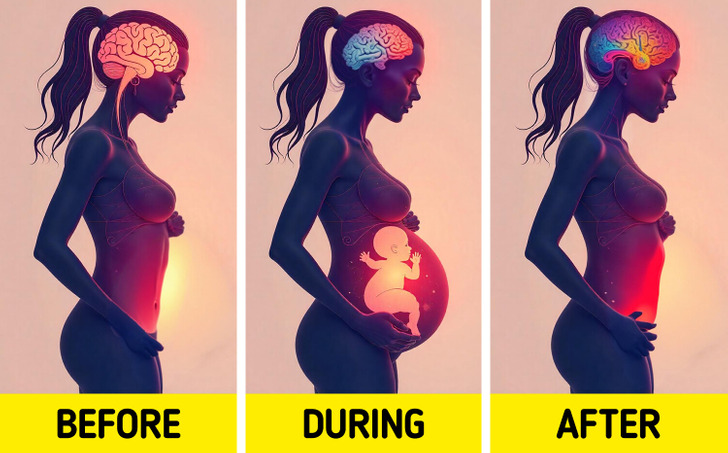12 True Stories So Twisted You Won’t Believe They’re Real


Pregnancy brings noticeable physical changes, but one of the most remarkable transformations happens in the brain. Research shows that pregnancy reshapes neural pathways, enhancing a mother’s ability to connect, nurture, and care for her baby. Here’s what science says about "baby brain"—and why it’s a sign of adaptation, not forgetfulness.

The truth behind this phenomenon is more inspiring than inconvenient. As pregnancy hormones like estrogen and progesterone flood your body, they reshape key areas of the brain, especially those involved in empathy and emotional processing.
According to Dr. Emily Jacobs, a neuroscientist from the University of California, Santa Barbara, these changes are all about making the brain more specialized for motherhood. Pregnancy brain shrinkage is not a bad thing, she explains. Think of it as a sculptor carefully chiseling marble to reveal something extraordinary. “You can see the sculpting of the brain unfold week by week,” she adds.

Scientists have observed that out of 400 brain regions examined, 80% showed a decline in gray matter, particularly in areas that help you understand emotions and connect with others.
This “pruning” process might sound alarming, but it’s a sign of your brain becoming more efficient. Dr. Elseline Hoekzema, head of the Pregnancy and the Brain Lab at Amsterdam University Medical Center, says these changes relate directly to a mother’s instincts. “Brain changes during pregnancy relate to the way a mother’s brain and body react to infants,” she notes.
These neurological tweaks aren’t just about bonding with your baby—they also help you adapt to the emotional and social demands of parenting, like staying patient during sleepless nights or understanding your baby’s cries.

Scientists believe that pregnancy makes the brain more sensitive to cues from your baby. Dr. Ronald Dahl, a neuroscientist at the University of California, Berkeley, explains that pregnancy hormones drive neurological changes, reshaping priorities and motivations and “sensitize individuals to learn adaptive things and create bonds and develop greater expertise in responding to an infant.”
Even white matter, the brain’s communication highways, gets an upgrade during pregnancy. It becomes more efficient, like smoothing out a bumpy road. This change makes it easier for different parts of the brain to work together, helping you stay attuned to your baby’s needs.

While some changes in the brain, like white matter improvements, fade after childbirth, others are long-lasting. The reduced gray matter volume in certain areas can persist for up to two years postpartum.
Dr. Jacobs calls these changes “permanent etchings in the brain,” designed to make moms more emotionally attuned and responsive to their children.
Interestingly, researchers found these patterns so distinct that they trained a computer to identify if a woman was pregnant based solely on her brain scans.
During pregnancy, the brain undergoes changes that help regulate the body’s response to stress. Studies indicate that brain regions responsible for emotional regulation and threat processing, such as the amygdala and the prefrontal cortex, adapt to make mothers more resilient. These changes reduce stress reactivity in certain situations, allowing the brain to prioritize the baby’s well-being.
Additionally, high levels of oxytocin—a key hormone during pregnancy—strengthen neural circuits linked to maternal bonding and protective responses, preparing women to care for their child with greater sensitivity and dedication.

Parenthood isn’t exclusive to biological mothers—fathers, adoptive parents, and others also display nurturing behaviors as the brain adapts to caregiving.
According to parenting researcher Dr. Jonny Kohl, the brain begins preparing for the major changes of parenthood much earlier than expected. He also emphasizes that human parenting is more intricate, involving classes, observational learning, and various environmental factors.
Scientists have found that pregnancy enhances connectivity between different brain regions, particularly those responsible for decision-making and emotional regulation. This increased communication may explain why many new mothers develop a heightened ability to multitask, as their brains become more efficient at balancing caregiving responsibilities with other daily tasks. These changes can persist well beyond the postpartum period, shaping long-term maternal instincts.

If you’re an expecting mother, remember this: those moments of forgetfulness or emotional shifts aren’t signs of weakness—they’re proof that your brain is transforming in remarkable ways to support you and your baby. Research shows that these cognitive changes help mothers become more attuned to their child’s needs, strengthening the emotional bond and enhancing caregiving abilities.
Embracing these changes can make the journey of motherhood feel less overwhelming and more empowering. Instead of seeing “baby brain” as a flaw, view it as a testament to your brain’s incredible ability to adapt and prepare you for the challenges and joys ahead.
And if you’re looking for even more inspiring examples of maternal love and resilience, dive into this article.











